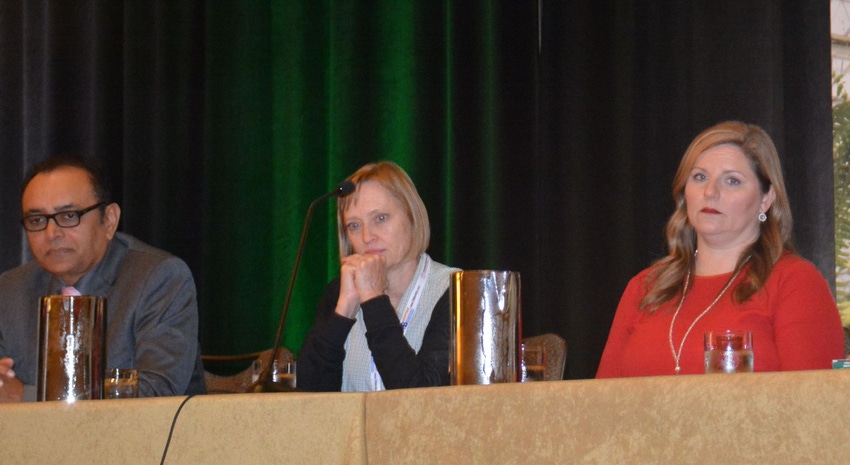
Major companies are committed to bringing more biologically-based, crop-protection products to farmers across the country because they see it as a key growth area.
Agricultural biostimulants include a diverse group of technologies such bacterial or microbial inoculants, biochemical materials, amino acids, humic acids, fulvic acids and seaweed extracts. A panel discussion at a sustainability symposium on biologicals sponsored by the Biological Products Industry Association in Orlando Oct. 11 focused on the opportunities to build credibility for the fledgling industry.
Jennifer Greminger is the lead for Monsanto’s global regulatory seed applied solutions and represented the American Seed Trade Association on the panel. She said biostimulants provide growers solutions in just one bag, such as seed-treated materials that can improve vigor, yield and stress-tolerance. Biostimulants deliver many benefits, but Greminger noted there are still many operational challenges in bringing the products to market.
“For those of us who are seed companies and have adopted these biostimulants over the last couple of years, we have struggled with application techniques,” Greminger said. “As you can imagine with living organisms you really have to be careful how you treat them. You have to minimize stress to the seed. “
Storage can be a challenge, both for companies providing the seed and for farmers who use them. Greminger said seed companies must take steps to safely store the seeds in controlled environment and ensure they are protected from damage until the farmer puts the seed in the ground
“You used to be able to keep your seed in a shed and that shed temperature could range from freezing cold to really hot and humid,” she said. “Those conditions aren’t always optimal for living organisms.”
Denise Manker, director of global agronomic development, biologicals at Bayer CropScience in Davis, Calif., said Bayer and other major ag chemical companies are committed to the growth of biostimulants, biological pesticides and other biologically-based crop protection products.
“Every major agricultural chemical company has embraced biological pesticides,” Manker told the symposium. “The belief of the industry is that this is contributing to the industry as a whole. It is important to have investment in this area. This is true for both biopesticides and biostimulants.”
The Biological Products Industry Association wants to communicate the value of biostimulants and promotes industry standards for biostimulant products. “We want to be working with regulatory agencies and be the leading source of information for these types of products,” she said.
Bayer is conducting research to better understand mode of action and to understand crop response to biological products. “We want to understand the science. We want to be able to communicate what the attributes are and give our customers a reproducible response that they can rely on,” she said.
Roger Tripathi, CEO and co-founder of Global BioAg Linkages in Alpine, Utah, said it is critical that biopesticides and biostimulants are science-based and research-based. Claims must be proven before products are brought to market.
Tripathi said biopesticdies and biostimulants are an important part of ICM, or integrated crop management, where you take care of the farmer’s bottom line from seed to post-harvest. Return on investment from the use of biologicals to farmers is a must.
“The quality has to be verified. We need a quality assurance program,” Tripathi said. “It’s about trust. We have to avoid selfish profiteering because that’s where we will kill the products. If you don’t deliver on the promise, that’s when you have a problem.”
About the Author(s)
You May Also Like






